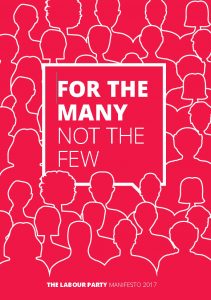News
General Election Manifestos 2017
This is a selected list of proposals, which affect disabled people, taken from the relevant manifesto. Follow the links to read the actual manifesto.



 Conservative Party Manifesto
Accessibility
- review disabled people’s access and amend regulations if necessary to improve disabled access to licensed premises, parking and housing
- create a new presumption of digital government services by default and an expectation that all government services are fully accessible online, with assisted digital support available for all public sector websites
- roll out Verify identification service, enabling one single, common and safe way for people to provide verification to all parts of government online services by 2020 – using own secure data that is not held by government
- Verify will eventually be made more widely available, so that people can safely verify their identify to access non-government services such as banking – expected for 2025
Benefits
- no plans for further radical welfare reform in this parliament but continue the roll-out of Universal Credit
- maintain the Triple Pensions Lock until 2020, and when it expires introduce a new Double Lock, meaning that pensions will rise in line with the earnings that pay for them, or in line with inflation – whichever is highest
- means test Winter Fuel Payments – the money released will be transferred directly to health and social care
- re pensioners – maintain free bus passes, eye tests, prescriptions and TV licences, for the duration of this parliament
Education and Skills
- replacing 13,000 existing technical qualifications with new qualifications, known as T-levels, across fifteen routes in subjects including construction, creative and design, digital, engineering and manufacturing, and health and science
- invest in further education colleges to make sure they have world-class equipment and facilities and will create a new national programme to attract experienced industry professionals to work in FE colleges
- discounted bus and train travel for apprentices
- new right to request leave for training for all employees
- new national retraining scheme – with costs of training met by the government, with companies able to gain access to the Apprenticeship Levy to support wage costs during the training period
Equality and human rights
- enact a Great Repeal Bill, converting EU law into UK law
- once EU law has been converted into domestic law, parliament will be able to pass legislation to amend, repeal or improve any piece of EU law it chooses, as will the devolved legislatures, where they have the power to do so
- will not bring the European Union’s Charter of Fundamental Rights into UK law
- will look into repealing or replacing the Human Rights Act once the process of Brexit has finished
- commitment to remain signatories to the European Convention on Human Rights for the duration of the next parliament – however British troops will in future be subject to the Law of Armed Conflict, which includes the Geneva Convention and UK Service Law, not the European Court of Human Rights
Heating and services
- work with providers of everyday essential services, like energy and telecoms, to reduce the extra costs that disability can incur
Housing
- meet 2015 commitment to build a million homes by the end of 2020 and half a million more by the end of 2022
- enter into new Council Housing Deals with local authorities to help them build more social housing – these will be new fixed-term social houses, which will be sold privately after ten to fifteen years with an automatic Right to Buy for tenants, the proceeds of which will be recycled into further homes
Social care and health
- align the future basis for means-testing for domiciliary care with that for residential care, so that people are looked after in the place that is best for them
- the value of the family home will be taken into account along with other assets and income, whether care is provided at home, or in a residential or nursing care home
- single capital floor, set at £100,000 – no matter how large the cost of care turns out to be, people will always retain at least £100,000 of their savings and assets, including value in the family home
- extend the current freedom to defer payments for residential care to those receiving care at home, so no-one will have to sell their home in their lifetime to pay for care
- forthcoming green paper will also address system-wide issues to improve the quality of care and reduce variation in practice (see page 65 of the manifesto)
- increase NHS spending by a minimum of £8 billion in real terms over the next five years
- give patients, via digital means or over the phone, the ability to book appointments, contact the 111 service, order repeat prescriptions, and access and update aspects of their care records, as well as control how their personal data is used
- first new Mental Health Bill for thirty-five years
- publish a green paper on young people’s mental health before the end of this year
- recruit up to 10,000 more mental health professionals
- specific task to improve standards of care for those with learning disabilities and autism – will work to reduce stigma and discrimination and implement in full the Transforming Care Programme
- new GP contract to help develop wider primary care services
- reform the contract for hospital consultants to reflect the changed nature of hospital care over the past twenty years
- make it a priority in Brexit negotiations that the 140,000 staff from EU countries can carry on working in the UK – but commitment to continue training more staff within UK
- new NHS numbers are not issued to patients until their eligibility has been verified
- increase the Immigration Health Surcharge, to £600 for migrant workers and £450 for international students
Work
- target to get 1 million more people with disabilities into employment over the next ten years
- legislate to give unemployed disabled claimants or those with a health condition personalised and tailored employment support
- for businesses employing former wards of the care system, someone with a disability, those with chronic mental health problems, and those who have been unemployed for over a year, will be given a holiday on employers’ National Insurance Contributions for a full year
- give employers the advice and support they need to hire and retain disabled people and those with health conditions
- harness the opportunities of flexible working and the digital economy to generate jobs for those whose disabilities make traditional work difficult
- increase the National Living Wage to 60 per cent of median earnings by 2020 and then by the rate of median earnings
- the Government is awaiting the results of the Taylor review but a new Conservative government will act to ensure that the interests of employees on traditional contracts, the selfemployed and those people working in the ‘gig’ economy are all properly protected
- amend health and safety regulations so that employers provide appropriate first aid training and needs assessment for mental health
- consider the findings of the Stevenson-Farmer Review into workplace mental health support, working with employers to encourage new products and incentives to improve the mental health and wellbeing support available to their employees
- train one million members of the public in basic mental health awareness and first aid to break the stigma of mental illness
 Labour party manifesto
The Labour party has also produced a separate document, entitled Funding Britain
Aim on Disability
Labour supports a social model of disability and pledges to remove the barriers in society that restrict opportunities and choices for people with disabilities. The previous Labour government signed the UN Convention on the Rights of Persons with Disabilities (UNCRPD). The next Labour government will sign the UNCRPD into UK law.
Benefits
- scrap the punitive sanctions regime
- scrap the Bedroom Tax
- increase Employment and Support Allowance (ESA) by £30 per week for those in the work-related activity group
- scrap the Work Capability and Personal Independence Payment assessments and replace them with a personalised, holistic assessment process that provides each individual with a tailored plan, building on their strengths and addressing barriers
- implement the court decision on Personal Independence Payment (PIP) so that there is real parity of esteem between those with physical and mental-health conditions
- end the privatisation of assessments (Atos, Maximus, Capita)
- end the pointless stress of reassessments for people with severe long-term conditions
- repeal cuts in the UC limited capacity for work element
- increase Carer’s Allowance by £11 to the level of Jobseekers’ Allowance.
- scrap cuts to Bereavement Support Payment.
- reform and redesign UC, ending six-week delays in payment and the ‘rape clause’
- guarantee the state pension ‘triple lock’ – throughout the next Parliament. It will rise by at least 2.5 per cent a year or be increased to keep pace with inflation or earnings, whichever is higher
- Winter Fuel Allowance and free bus passes will be guaranteed as universal benefits
- protect the pensions of UK citizens living overseas in the EU or further afield
Education and Skills
- scrap Conservative plans for schools to pay the apprenticeship levy
- extend schools-based counselling to all schools to improve children’s mental health
- deliver a strategy for children with special educational needs and disabilities (SEND) based on inclusivity, and embed SEND more substantially into training for teachers and non-teaching staff, so that staff, children and their parents are properly supported
- restore the Education Maintenance Allowance for 16 to 18-year-olds from lower and middle income backgrounds
- free, lifelong education in Further Education (FE) colleges, enabling everyone to upskill or retrain at any point in life
- replace Advanced Learner Loans and upfront course fees with direct funding, making FE courses free at the point of use, including English
for Speakers of Other Languages (ESOL) courses - set targets to increase apprenticeships for people with disabilities, care leavers and veterans, and ensure broad representation of women, BAME, LGBT and people with disabilities in all kinds of apprenticeships
- maintain the apprenticeship levy but ensure high quality by requiring the Institute for Apprenticeships and Technical Education to report on an annual basis to the Secretary of State on quality outcomes of completed apprenticeships to ensure they deliver skilled workers for employers and real jobs for apprentices at the end of their training.
- Set a target to double the number of completed apprenticeships at NVQ level 3 by 2022
- reintroduce maintenance grants for university students
- abolish university tuition fees
Equality and human rights
- Labour will legislate to make terminal illness a protected characteristic under the Equality Act.
- give British Sign Language full recognition as a recognised language
Hate crime
- ensure that under the Istanbul Convention, disability hate crime and violence against women with disabilities is reported annually, with national actions plans to address these issues
Heating
- introduce a Homes Fit for Heroes programme that will insulate the homes of disabled veterans for free
- Winter Fuel Allowance guaranteed as a universal benefit
Housing
- make new three-year tenancies the norm for private renters, with an inflation cap on rent rises
- remove government restrictions that stop councils building homes and begin the biggest council building programme for at least 30 years
- ditch Conservatives’ ban on long-term council tenancies to give council tenants security in their homes
- scrap the Bedroom Tax
- reinstate Housing Benefit for under-21s
- suspend the right-to-buy policy for council and social housing to protect affordable homes for local people, with councils only able to resume sales if they can prove they have a plan to replace homes sold like-for-like
Poverty
- Labour will introduce a new Child Poverty Strategy
Social care and health
- increase the social care budgets by a further £8 billion over the lifetime of the next Parliament, including an additional £1 billion for the first year.
- implement the principles of the Ethical Care Charter, already adopted in 28 council areas, ending 15-minute care visits and providing care workers with paid travel time, access to training and an option to choose regular hours
- create a National Care Service, which will be built alongside the NHS, with a shared requirement for single commissioning, partnership arrangements, pooled budgets and joint working arrangements – in its first years, the service will require an additional £3 billion of public funds every year, enough to place a maximum limit on lifetime personal contributions to care costs, raise the asset threshold below which people are entitled to state support, and provide free end of life care.
- ensure that everyone with a long-term condition, such as those with diabetes, will have the right to a specialised care plan, and access to condition-management education
- commitment to making Britain autism friendly
Work
- commission a report into expanding the Access to Work programme
- strengthen access to justice for people with disabilities by enhancing the 2010 Equality Act, enabling discrimination at work to be challenged
- work with employers, trade unions and public services to improve awareness of neurodiversity in the workplace and in society
- give all workers equal rights from day one, whether part-time or full-time, temporary or permanent
- ban zero hours contracts
- raise the Minimum Wage to the level of the Living Wage
- ban unpaid internships
- abolish employment tribunal fees
Lib Dem manifesto
Benefits
- uprate working-age benefits at least in line with inflation
- abandon the two-child policy on family benefits and abolish the two children‘rape clause’
- reverse cuts to housing benefit for 18-21-year-olds and increase the rates of Jobseeker’s Allowance and Universal Credit for those aged 18-24 at the same rate as minimum wages.
- reverse cuts to Employment Support Allowance to those in the work-related activity group.
- increase Local Housing Allowance (LHA) in line with average rents in an area
- scrap the ‘bedroom tax’, whilst also incentivising local authorities to help tenants ‘downsize’.
- scrap the Work Capability Assessment and replace it with a new system, run by local authorities according to national rules, including a ‘real world’ test that is based on the local labour market
- withdraw eligibility for the Winter Fuel Payment from pensioners who pay tax at the higher rate (40%)
- retain the free bus pass for all pensioners
- ensure that those using food banks are aware of their rights and how they can access hardship payments where relevant
- maintain pensions triple lock
- let both parents earn before their Universal Credit is cut and also reverse cuts to the Family Element
- reverse cuts to Work Allowances in Universal Credit
Education and skills
- ensure that all teaching staff have the training to identify mental health issues and that schools provide immediate access for pupil support and counselling
- reinstate maintenance grants for the poorest students
Equality and human rights
- extend the Equality Act to all large companies with more than 250 employees
- oppose any attempt to withdraw from the ECHR or abolish or water down the Human Rights Act
- introduce a digital bill of rights that protects people’s powers over their own information, supports individuals over large corporations, and preserves the neutrality of the internet
- end the ministerial veto on release of information under the Freedom of Information Act, and take steps to reduce the proportion of FOI requests where information is withheld by government departments
Hate crime
- tackle bullying in schools
Housing
- three-year tenancies for private renters
Social care and health
- implement a cap on the cost of social care
- develop a Carer’s Passport scheme to inform carers of their NHS rights
- create a cross-party health and social care convention, bringing together stakeholders from all political parties, patients groups, the public and professionals from within the health and social care system to carry out a
comprehensive review of the longer-term sustainability of the health and social care finances and workforce, and the practicalities of greater integration - equal care for mental health – a number of measures – see pages 19 and 20 of the manifesto
- move towards a health and social care system that empowers and encourages people to better manage their own health and conditions and to live healthier – via various strategies (see pages 22 and 23 of the manifesto)
lives - support the Armed Forces Covenant and ongoing work to support veterans’ mental health
Transport
- continue the Access for All programme, improving disabled access to public transport as a key priority
- increase accessibility to public places and transport by making more stations wheelchair accessible
- improve the legislative framework governing blue badges
- set up a benchmarking standard for accessible cities
- bring into effect the provisions of the 2010 Equality Act on discrimination by private hire vehicles and taxis
Work
- raise awareness of, and seek to expand, Access to Work
- create a formal right to request a fixed contract and consult on introducing a right to make regular patterns of work contractual after a period of time
- scrap employment tribunal fees
- separate employment support from benefits administration – making Jobcentres places of training and support into work
- improve links between Jobcentres and Work Programme providers and the local NHS to ensure all those in receipt of health-related benefits are getting
the care and support to which they are entitled - accelerate the roll-out of Individual Placement and Support, to get people with mental ill-health back into work
Find us
Nearest tube: Elephant & Castle underground station (Northern and Bakerloo lines).
Nearest Railway Station: Elephant & Castle
Buses from Elephant and Castle: ask bus driver for Burgess Park. Bus numbers: 12, 171, 148, 176, 68, 484, 42, 40, 45